 Libri di Avishai Margalit su Unilibro.it) Libri di Avishai Margalit su Unilibro.it)
|
|
2023 |
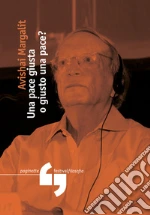 Title :
Una pace giusta o giusto una pace?
Title :
Una pace giusta o giusto una pace?Author: Margalit Avishai Publisher: Consorzio Festivalfilosofia Quale statuto morale ha il compromesso fatto per amore della pace a scapito della giustizia? Sulla tensione tra pace e giustizia. € 3,50
|
|
|
2017 |
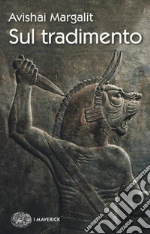 Title :
Sul tradimento
Title :
Sul tradimentoAuthor: Margalit Avishai Publisher: Einaudi L'adulterio, il tradimento, l'apostasia non vengono più considerati con la gravità di una volta. Eppure molto spesso siamo testimoni di storie di tradimenti, e molti di noi hanno direttamente sperimentato un atto di infedeltà. Avishai Margalit sostiene che la tensione tra l'ubiquità del tradimento e il progressivo allentamento della sua considerazione è un segno della differenza esistente tra etica e moralità nei rapporti umani. Sul tradimento offre una spiegazione filosofica della natura delle più importanti relazioni umane - con amici, familiari o all'interno della propria comunità - attraverso la loro patologia, il tradimento. Non si può definire con sicurezza cosa sia un tradimento. Chi per alcuni è un informatore, per altri è qualcuno che ti pugnala alle spalle: un eroe o un traditore. Eppure, il concetto di ciò che significa tradire è costante attraverso i secoli e le culture. Il tradimento mina la fiducia più solida, dissolve il collante che mantiene unite le nostre relazioni più salde. L'epoca attuale dà maggior rilievo ai rapporti di fiducia tra stranieri, a quelle relazioni che assumono un ruolo centrale nell'economia globalizzata, e che però, secondo Margalit, sono controllate dalla moralità. 'Sul tradimento' si occupa invece dell'etica: di ciò che dobbiamo alle persone e ai gruppi che ci forniscono un senso di appartenenza. L'autore attinge a fonti letterarie, storiche e personali (la sua infanzia durante la guerra arabo-israeliana del 1948) e analizzando il concetto di tradimento considera ciò che sono e dovrebbero essere i nostri rapporti più importanti, dando € 21,00
Scontato: € 19,95
|
|
|
1917 |
 Title :
On Betrayal
Title :
On BetrayalAuthor: Margalit Avishai Publisher: Harvard Univ Pr € 24,10
|
|
|
1913 |
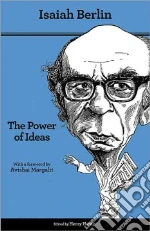 Title :
The Power of Ideas
Title :
The Power of IdeasAuthor: Berlin Isaiah, Hardy Henry (EDT), Margalit Avishai (FRW) Publisher: Princeton Univ Pr The essays collected in this new volume reveal Isaiah Berlin at his most lucid and accessible. He was constitutionally incapable of writing with the opacity of the specialist, but these shorter, more introductory pieces provide the perfect starting-point for the reader new to his work. Those who are already familiar with his writing will also be grateful for this further addition to his collected essays. The connecting theme of these essays, as in the case of earlier volumes, is the crucial social and political role--past, present and future--of ideas, and of their progenitors. A rich variety of subject-matters is represented--from philosophy to education, from Russia to Israel, from Marxism to romanticism--so that the truth of Heine's warning is exemplified on a broad front. It is a warning that Berlin often referred to, and provides an answer to those who ask, as from time to time they do, why intellectual history matters. Among the contributions are 'My Intellectual Path,' Berlin's last essay, a retrospective autobiographical survey of his main preoccupations; and 'Jewish Slavery and Emancipation,' the classic statement of his Zionist views, long unavailable in print. His other subjects include the Enlightenment, Giambattista Vico, Vissarion Belinsky, Alexander Herzen, G.V. Plekhanov, the Russian intelligentsia, the idea of liberty, political realism, nationalism, and historicism. The book exhibits the full range of his enormously wide expertise and demonstrates the striking and enormously engaging individuality, as well as the power, of his own ideas. 'Over a hundred years ago, the German poet Heine warned the French not to underestimate the power of ideas: philosophical concepts nurtured in the stillness of a professor's study could destroy a civilization.'--Isaiah Berlin, Two Concepts of Liberty, 1958. This new edition adds a number of previously uncollected pieces, including Berlin's earliest statement of the pluralism of values for which he is famous. € 22,30
|
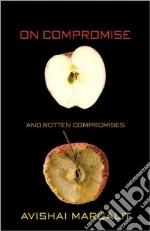 Title :
On Compromise and Rotten Compromises
Title :
On Compromise and Rotten CompromisesAuthor: Margalit Avishai Publisher: Princeton Univ Pr When is political compromise acceptable--and when is it fundamentally rotten, something we should never accept, come what may? What if a rotten compromise is politically necessary? Compromise is a great political virtue, especially for the sake of peace. But, as Avishai Margalit argues, there are moral limits to acceptable compromise even for peace. But just what are those limits? At what point does peace secured with compromise become unjust? Focusing attention on vitally important questions that have received surprisingly little attention, Margalit argues that we should be concerned not only with what makes a just war, but also with what kind of compromise allows for a just peace. Examining a wide range of examples, including the Munich Agreement, the Yalta Conference, and Arab-Israeli peace negotiations, Margalit provides a searching examination of the nature of political compromise in its various forms. Combining philosophy, politics, and history, and written in a vivid and accessible style, On Compromise and Rotten Compromises is full of surprising new insights about war, peace, justice, and sectarianism. € 17,80
|
|
2011 |
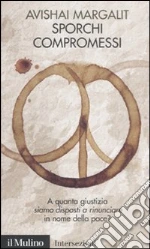 Title :
Sporchi compromessi
Title :
Sporchi compromessiAuthor: Margalit Avishai Publisher: Il Mulino Quand'è che il compromesso politico è accettabile e quando si tratta invece di qualcosa di 'sporco'? E cosa fare se un compromesso sporco è necessario sul piano politico? L'arte del compromesso è una grande virtù politica, soprattutto quando la si esercita nell'interesse della pace. Ma vi sono limiti morali oltre i quali diviene inaccettabile anche se il fine è il bene comune. A confronto sono qui due visioni del compromesso e della politica: una 'economica', per la quale non esistono beni che non siano scambiabili; l'altra, 'etica' o 'religiosa', che considera certe transazioni un tabù assoluto. Esaminando un'ampia gamma di esempi - tra i quali il trattato di Monaco, la conferenza di Yalta e i negoziati arabo-isreliani - Margalit getta una luce nuova e sorprendente sulle nozioni di guerra, pace e giustizia. € 16,00
Scontato: € 15,20
|
|
|
2009 |
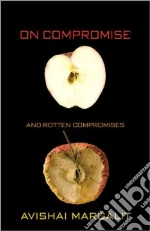 Title :
On Compromise and Rotten Compromises
Title :
On Compromise and Rotten CompromisesAuthor: Margalit Avishai Publisher: Princeton Univ Pr When is political compromise acceptable--and when is it fundamentally rotten, something we should never accept, come what may? What if a rotten compromise is politically necessary? Compromise is a great political virtue, especially for the sake of peace. But, as Avishai Margalit argues, there are moral limits to acceptable compromise even for peace. But just what are those limits? At what point does peace secured with compromise become unjust? Focusing attention on vitally important questions that have received surprisingly little attention, Margalit argues that we should be concerned not only with what makes a just war, but also with what kind of compromise allows for a just peace. Examining a wide range of examples, including the Munich Agreement, the Yalta Conference, and Arab-Israeli peace negotiations, Margalit provides a searching examination of the nature of political compromise in its various forms. Combining philosophy, politics, and history, and written in a vivid and accessible style, On Compromise and Rotten Compromises is full of surprising new insights about war, peace, justice, and sectarianism. € 29,70
|
|
|
2006 |
 Title :
L'etica della memoria
Title :
L'etica della memoriaAuthor: Margalit Avishai Publisher: Il Mulino Recuperare il passato, rivivere eventi ed emozioni: nella costruzione morale degli individui così come delle collettività può essere questo uno dei compiti più dolorosi. Ma ci sono cose che abbiamo il dovere di ricordare? Può davvero la memoria condivisa valere a fondare o a rafforzare il sentimento identitario di una comunità? Esiste insomma un'etica della memoria? Tenendo sin dal principio ferma la distinzione fra etica e morale, l'autore si misura con tali interrogativi in pagine dense di riflessioni colte, ma anche di spunti di cronaca recente, di testimonianze e di ricordi personali, per giungere infine ad affermare che un'etica della memoria è un'etica tanto del ricordo quanto dell'oblio e del perdono, e che dunque la questione cruciale, se ci siano cioè cose che dobbiamo ricordare, ne comporta una parallela, se ci siano cose che dobbiamo invece dimenticare. € 13,00
Scontato: € 12,35
|
|
|
2005 |
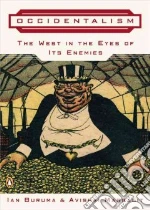 Title :
Occidentalism
Title :
OccidentalismAuthor: Buruma Ian, Margalit Avishai Publisher: Penguin Group USA Twenty-five years ago, Edward Said's Orientalism spawned a generation of scholarship on the denigrating and dangerous mirage of 'the East' in the Western colonial mind. But 'the West' is the more dangerous mirage of our own time, Ian Buruma and Avishai Margalit argue, and the idea of 'the West' in the minds of its self-proclaimed enemies remains largely unexamined and woefully misunderstood. Occidentalism is their groundbreaking investigation of the demonizing fantasies and stereotypes about the Western world that fuel such hatred in the hearts of others. € 13,40
|
|
|
2004 |
 Title :
The Ethics of Memory
Title :
The Ethics of MemoryAuthor: Margalit Avishai Publisher: Harvard Univ Pr Much of the intense current interest in collective memory concerns the politics of memory. In a book that asks, 'Is there an ethics of memory?' Avishai Margalit addresses a separate, perhaps more pressing, set of concerns. The idea he pursues is that the past, connecting people to each other, makes possible the kinds of 'thick' relations we can call truly ethical. Thick relations, he argues, are those that we have with family and friends, lovers and neighbors, our tribe and our nation--and they are all dependent on shared memories. But we also have 'thin' relations with total strangers, people with whom we have nothing in common except our common humanity. A central idea of the ethics of memory is that when radical evil attacks our shared humanity, we ought as human beings to remember the victims. Margalit's work offers a philosophy for our time, when, in the wake of overwhelming atrocities, memory can seem more crippling than liberating, a force more for revenge than for reconciliation. Morally powerful, deeply learned, and elegantly written, The Ethics of Memory draws on the resources of millennia of Western philosophy and religion to provide us with healing ideas that will engage all of us who care about the nature of our relations to others. € 31,90
|
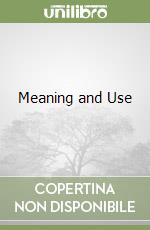 Title :
Meaning and Use
Title :
Meaning and UseAuthor: Avishai Margalit Publisher: BERTRAMS PRINT ON DEMAND € 26,60
|
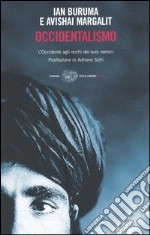 Title :
Occidentalismo. L'Occidente agli occhi dei suoi nemici
Title :
Occidentalismo. L'Occidente agli occhi dei suoi nemiciAuthor: Buruma Ian; Margalit Avishai Publisher: Einaudi Venticinque anni fa 'Orientalismo' di Edward Said svelava come il concetto di 'Oriente' fosse il prodotto dello sguardo colonialista dell'Occidente. Cosa succede quando 'gli altri' ci osservano e vedono in noi solo i rappresentanti di un pensiero idiota, votato al culto del denaro e del successo? Attraverso una 'spedizione archeologica' nella cultura occidentale, gli autori dimostrano come l'Occidente senz'anima e capace solo di pensiero-calcolo è un'immagine nata e alimentata in Occidente. E ora si rovescia nella versione 'occidentalista' dei fondamentalisti islamici che ritraggono un'intera società come una massa di decadenti avidi, premessa intellettuale alla loro distruzione. € 11,50
|
|
2001 |
 Title :
Volti d'Israele
Title :
Volti d'IsraeleAuthor: Margalit Avishai Publisher: Carocci € 15,40
|
|
|
2000 |
 Title :
Volti d'Israele
Title :
Volti d'IsraeleAuthor: Margalit Avishai Publisher: Carocci Come in un album di famiglia scorrono nelle pagine di Margalit i ritratti di alcune delle personalità più rappresentative della politica israeliana, da Ben Gurion a Yitzhak Rabin, da Shamir a Benjamin Netanyahu, da Shimon Peres all'attuale primo ministro Ehud Barak. Ma non mancano gli aspetti minuti e poco noti della vita quotidiana, né soprattutto le grandi questioni irrisolte di ieri e di oggi: i difficili rapporti con il mondo arabo, il ruolo di Gerusalemme, l'ascesa degli ultraortodossi, l'eredità del sionismo, le inesauribili domande poste dall'olocausto, e il dovere della memoria. € 23,80
|
|
|
1998 |
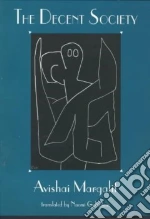 Title :
The Decent Society
Title :
The Decent SocietyAuthor: Margalit Avishai, Goldblum Naomi (TRN) Publisher: Harvard Univ Pr Avishai Margalit builds his social philosophy on this foundation: a decent society, or a civilized society, is one whose institutions do not humiliate the people under their authority, and whose citizens do not humiliate one another. What political philosophy needs urgently is a way that will permit us to live together without humiliation and with dignity. Most of the philosophical attention nowadays is drawn to the ideal of the just society based on the right balance between freedom and equality. The ideal of the just society is a sublime one but hard to realize. The decent society is an ideal which can be realized even in our children's lifetime. We should get rid of cruelty first, advocated Judith Shklar. Humiliation is a close second. There is more urgency in bringing about a decent society than in bringing about a just one. Margalit begins concretely where we live, with all the infuriating acts of humiliation that make living in the world so difficult. He argues in a concrete way in the spirit of Judith Shklar and Isaiah Berlin. This is a social philosophy that resists all those menacing labels that promote moral laziness, just as it urges us to get beyond the behavior that labels other human beings. Margalit can't be earmarked as liberal or conservative. If a label is necessary, then the most suitable is George Orwell's humane socialism, a far cry from Animal Farm socialism with its many tools of oppression. How to be decent, how to build a decent society, emerges out of Margalit's analysis of the corrosive functioning of humiliation in its many forms. This is a thoroughly argued and, what is much more, a deeply felt book that springs from Margalit's experience at the borderlands of conflicts between Eastern Europeans and Westerners, between Palestinians and Israelis. € 30,80
|
|
|
1994 |
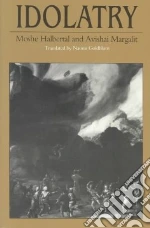 Title :
Idolatry
Title :
IdolatryAuthor: Halbertal Moshe, Margalit Avishai, Goldblum Naomi (TRN) Publisher: Harvard Univ Pr 'You shall have no other gods besides Me.' This injunction, handed down through Moses three thousand years ago, marks one of the most decisive shifts in Western culture: away from polytheism toward monotheism. Despite the momentous implications of such a turn, the role of idolatry in giving it direction and impetus is little understood. This book examines the meaning and nature of idolatry--and, in doing so, reveals much about the monotheistic tradition that defines itself against this sin. The authors consider Christianity and Islam, but focus primarily on Judaism. They explore competing claims about the concept of idolatry that emerges in the Hebrew Bible, as a 'whoring after false gods.' Does such a description, grounded in an analogy of sexual relations, presuppose the actual existence of other gods with whom someone might sin? Or are false gods the product of 'men's hands,' simply a matter of misguided belief? The authors show how this debate, over idolatry as practice or error, has taken shape and has in turn shaped the course of Western thought--from the differentiation between Jewish and Christian conceptions of God to the distinctions between true and false belief that inform the tradition of religious enlightenment. Ranging with authority from the Talmud to Maimonides, from Marx to Nietzsche and on to G. E. Moore, this brilliant account of a subject central to our culture also has much to say about metaphor, myth, and the application of philosophical analysis to religious concepts and sensibilities. Its insights into pluralism and intolerance, into the logic and illogic of the arguments religions aim at each other, make Idolatry especially timely and valuable in these days of dark and implacable religious difference. € 44,10
|